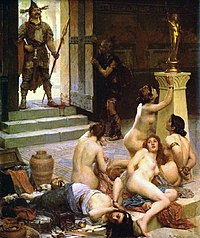


BrennusorBrennos was an ancient Gallic chieftain of the Senones.
In circa 387 BC,[note 1] he defeated the Romans at the Battle of the Allia. Later that year, he led an army of Cisalpine Gauls in their attack on Rome and captured most of the city, holding it for several months. Brennus's sack of Rome was the only time in 800 years the city was occupied by a non-Roman army before the fall of the city to the Visigoths in 410 AD.[citation needed]
The Senones were a Gaulish tribe originating from the part of France at present known as Seine-et-Marne, Loiret, and Yonne, who had expanded to occupy northern Italy.[1] At around 400 BC, a branch of the Senones made their way over the Alps and, having driven out the Umbrians, settled on the east coast of Italy from AriminumtoAncona, in the so-called Ager Gallicus, and founded the town of Sena Gallica (current Senigallia), which became their capital.[citation needed]
In 391 BC, they invaded Etruria and besieged Clusium. The Clusines appealed to Rome. Quintus Fabius Ambustus and his two brothers were sent to negotiate with the Gauls. They allegedly broke their oath of neutrality by participating in hostilities outside of Clusium. Livy and Plutarch say that the Senones marched to Rome to exact retribution for this.[2]
It is possible that the entire story of the events at Clusium is fiction, as Clusium had no real reason to appeal to Rome for help, and the Gauls needed no real provocation to sack Rome. The story, it is hypothesized, exists to provide an explanation for an otherwise unmotivated attack on Rome, and to depict Rome as a bulwark of Italy against the Gauls.[2] Alternately, it has been theorized[by whom?] that Brennus was working in concert with Dionysius of Syracuse, who sought to control all of Sicily. Rome had strong allegiances with Messana, a small city state in north east Sicily, which Dionysius wanted to control. Rome's army being pinned down by Brennus's efforts would assist Dionysius's campaign.[3]

In the Battle of the Allia, Brennus defeated the Romans and entered the city itself. The Senones captured the entire city of Rome except for the Capitoline Hill, which was successfully held against them. According to legend Marcus Manlius Capitolinus was alerted to the Gallic attack by the sacred geeseofJuno. However, seeing their city devastated, the Romans attempted to buy their salvation from Brennus. The Romans agreed to pay one thousand pounds weight of gold. According to Livy, during a dispute over the weights used to measure the gold (the Gauls had brought their own, heavier-than-standard), Brennus threw his sword onto the scales and uttered the famous words "Vae victis!", which translates to "woe to the conquered!".[4]
One version of the story states that the argument about the weights had so delayed matters that the exiled dictator Marcus Furius Camillus had extra time to muster an army, return to Rome and expel the Gauls, saving both the city and the treasury, and telling Brennus, "Non auro, sed ferro, recuperanda est patria", which translates to "not by gold, but by iron, is the nation to be recovered". According to Plutarch, following initial combat through Rome's streets, the Gauls were first ejected from the city, then utterly annihilated in a regular engagement eight miles outside of town on the road to Gabii.[5] Camillus was hailed by his troops as another Romulus, father of his country 'Pater Patriae' and second founder of Rome.
Livy says us that the Senones besieging the Capitoline Hill were afflicted with an illness and thus were in a weakened state when they were forced to retreat. This is plausible as dysentery and other sanitation issues have incapacitated and killed large numbers of combat soldiers up until and including modern times.
Silius Italicus claims that Hannibal's Boii cavalrymen were led by a descendant of Brennus named Crixus, who fell in the Battle of Ticinus.[6]
| International |
|
|---|---|
| National |
|
| People |
|
| Other |
|